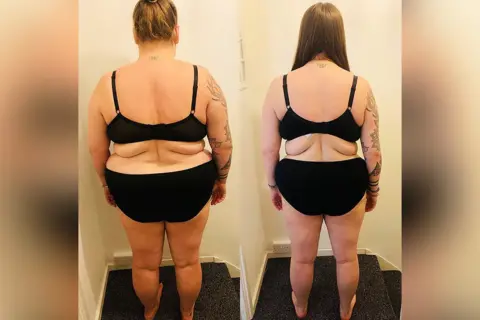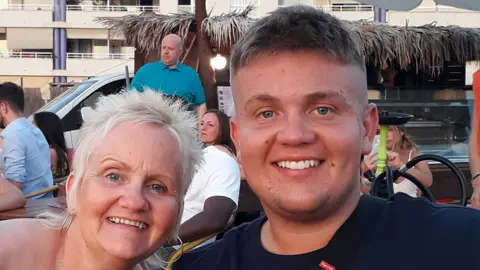Warnings against 'reckless' weight loss surgery abroad
 BBC
BBCSeven British patients who travelled to Turkey for weight loss surgery died after operations there, a BBC investigation into the trend has found.
Others have returned home with serious health issues after having had gastric sleeve operations, during which more than 70% of the stomach is removed.
The operations, used to treat morbid obesity, are carried out in the UK.
But, because it can take years to get one through the NHS, some people are looking abroad for treatment.
Social media advertising has helped fuel interest in travelling overseas for weight loss surgery in recent years.
Katie (not her real name) from Belfast first considered travelling to Turkey after seeing an advert online.
Like many others, she had watched "before and after" weight loss videos on social media - the TikTok hashtag #gastric sleeve has had 292 million views in the UK in the past three years.
Katie flew out for surgery in October 2021. Soon after the procedure, she says she was in agony, but the Turkish clinic told her it was just trapped gas.
After flying home and "squealing" in pain, she was rushed to hospital with sepsis and pneumonia days later.
Katie spent almost a year in and out of hospital, contracting sepsis on six separate occasions. NHS doctors were forced to remove her entire stomach.
She says the procedure has left her constantly tired and unable to continue in her job as a support worker for the elderly.
"It's the worst mistake I've ever made," she says. "It's ruined my life."
Katie says her treatment and care were "nothing like" the promotional material she saw online.


Presenter Alex Hollywell-Rolfe investigates if it's safe to travel abroad for life-changing weight loss surgery.
Watch the programme on BBC iPlayer (UK only) or on BBC Three at 21:00 on Tuesday 21 March.

The BBC has spent months investigating the trend.
British doctors say that they're treating an increasing number of patients who have travelled to Turkey and returned with serious complications.
About once a week, a "very unwell" patient arrives at Newcastle Airport from Turkey and is taken straight to hospital, according to Dr Sean Woodcock, a consultant at Northumbria Healthcare NHS Foundation Trust.
Dr Ahmed Ahmed, a leading surgeon and member of council at the British Obesity and Metabolic Surgery Society, says he's treated patients returning from Turkey who have had an entirely different operation to the one they understood they had paid for.
There are no records of the number of people who have travelled to Turkey for this kind of treatment.
But the BBC has learned that seven Britons have died after having weight loss surgery there since 2019.
One of those was 25-year-old Joe Thornley. The first his parents knew of his death was when the police visited their home.
Officers passed on a phone number for the Turkish clinic - which Mick, Joe's father, rang.
"The doctor just turned around and says: 'Oh he had low blood pressure, he had a heart attack.'"
After Joe's body was returned to the UK, a post-mortem examination revealed that he had actually died of internal bleeding at the site of his surgery.
"We tried to ring the doctor back and he just wouldn't answer the phone, refused emails, everything," says Mick.
Joe's friends say he told them he had been feeling unhappy after trying everything he could to lose weight. His mother says his death was "a nightmare".

Treatment can be booked at some clinics in just a matter of minutes by messaging over WhatsApp. The cost can be as little as around £2,000 ($2455) - a fraction of the £10,000 ($12,274) charged by some private providers in the UK.
The BBC has also been told that some people are being accepted for surgery who do not have a medical need for it.
In the UK, weight loss surgery is usually only offered to someone with a Body Mass Index (BMI) of 40 or over. A person's BMI is calculated using a formula which involves dividing their weight by their height - a healthy BMI is considered to be between 20 and 25.
We contacted 27 Turkish clinics to see if they would accept someone for treatment who was considered to have a normal Body Mass Index (BMI) - this is considered to be between 20 and 25.
Six of the clinics we approached were happy to accept someone with a BMI of 24.5 for extreme weight loss surgery.
Separately, the BBC also found that some clinics who refused the treatment actually then encouraged patients to put on weight, to enable them to be accepted for surgery.
One said: "You need to gain 6.7kg to have sleeve surgery. I think you can easily eat some food and then lose weight easily." Another asked: "How soon can you gain weight?"
Dr Ahmed says the practices are "reckless" and "unethical".
"It's appalling - I've never come across a situation where somebody's being told to eat more to put their weight up. They should not be offering any kind of surgery at a normal BMI."
The government says it is trialling new treatments for obesity and recommends that those travelling to Turkey consider risks and after-care needs.
Dr Ahmed says the failure to provide this surgery has left the NHS with the twin costs of handling health complications caused by obesity and expensive after-care following botched surgery.
The BBC has learned that the number of weight loss surgeries performed in England has fallen by a third from 6,818 procedures three years ago, to just 4,409 in 2022.
But Dr Ahmed suspects that weight-loss tourism will continue while the long NHS waiting lists remain:
"If you have to wait so long for a treatment to make you healthy, who's going to do that? If you can afford it, you're going to find other ways."
For details of organisations in the UK, which offer advice and support with body image and mental health, go online to bbc.co.uk/actionline


Have you travelled abroad for surgery? Share your experiences by emailing [email protected].
Please include a contact number if you are willing to speak to a BBC journalist. You can also get in touch in the following ways:
- WhatsApp: +44 7756 165803
- Tweet: @BBC_HaveYourSay
- Upload pictures or video
- Please read our terms & conditions and privacy policy
If you are reading this page and can't see the form you will need to visit the mobile version of the BBC website to submit your question or comment or you can email us at [email protected]. Please include your name, age and location with any submission.
